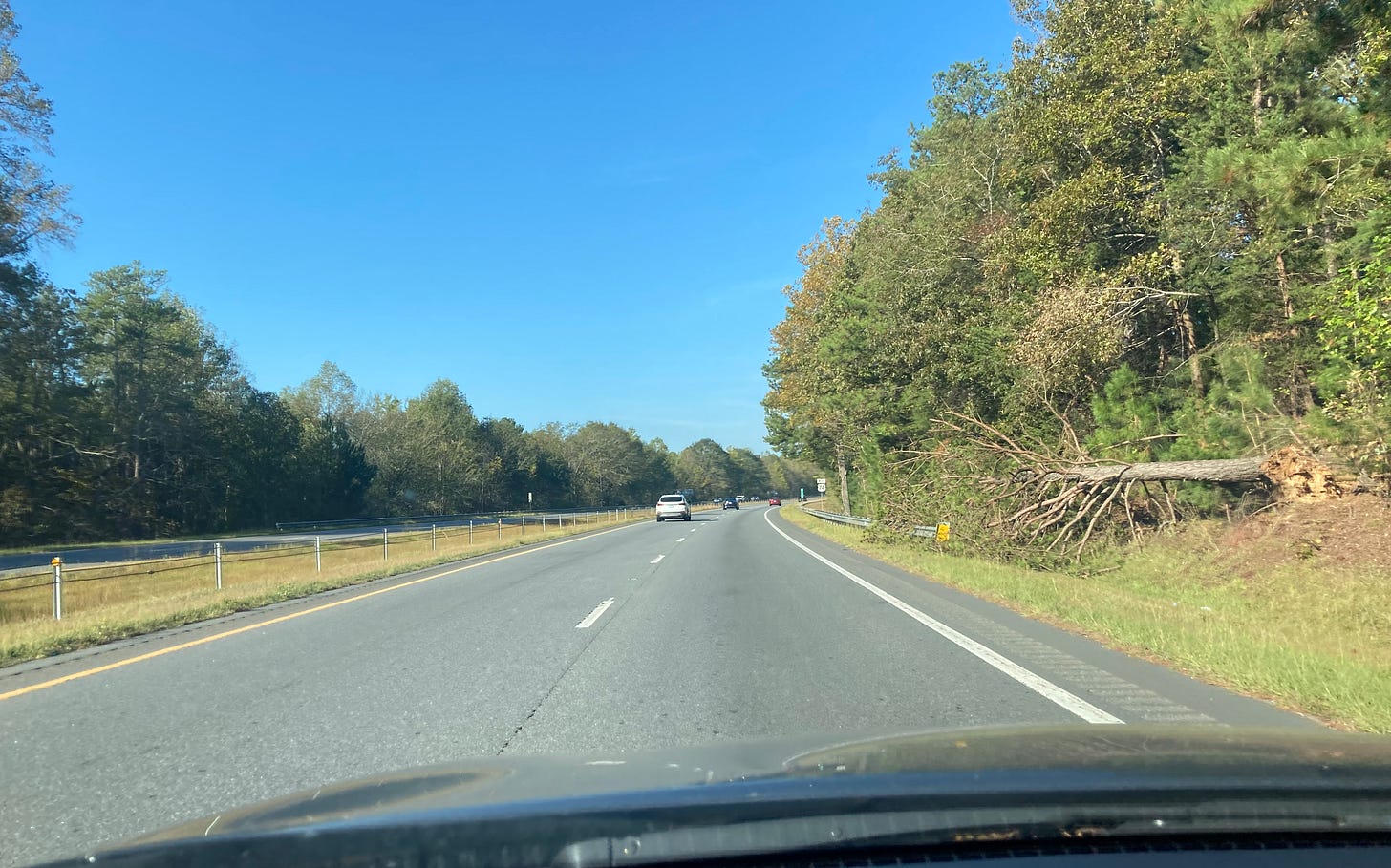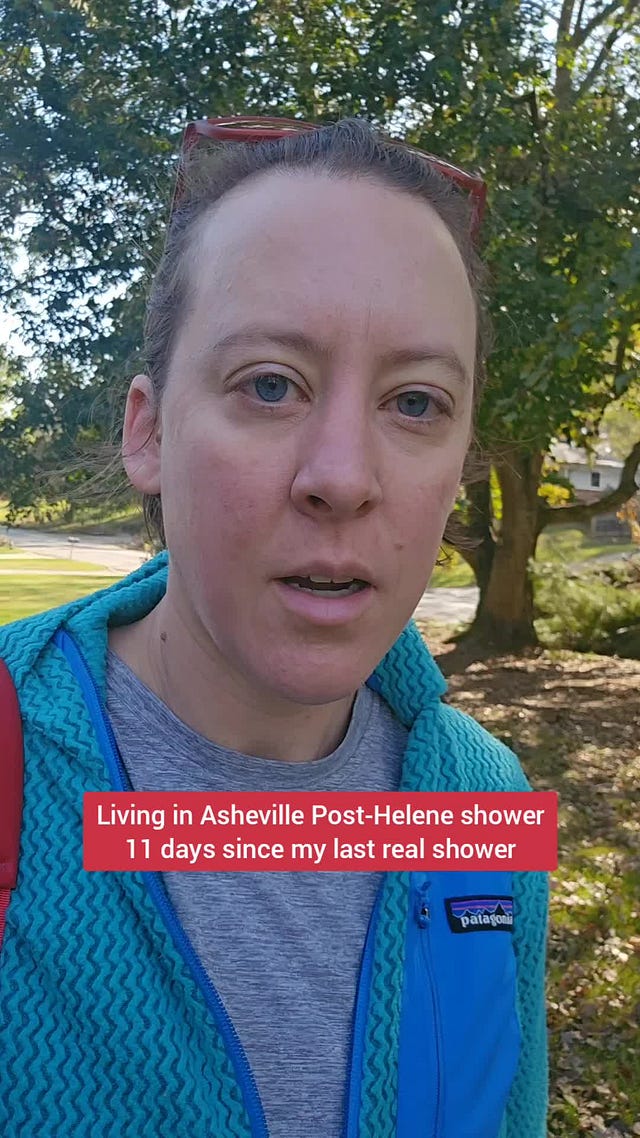A morning drive west of Shelby
Plus: Cold front moves in; Violent threats pause FEMA operations; Disabled and elderly people left vulnerable; Christmas tree farmers worry about roads; Woman films TikTok of first shower in 11 days
You’re reading Mountain Updates, a free pop-up newsletter from The Charlotte Ledger examining the crisis and recovery in the N.C. mountains. Ledger subscribers can add Mountain Updates on their “My Account” page.
Sign up for free:
On a popular route from Charlotte to the N.C. mountains, signs slowly emerge that something is amiss
The first thing you notice are the trees.
Driving west from Charlotte on Sunday morning, on one of the most common routes to the mountains — I-85 to U.S. 74 to I-26 — everything appears normal until just after Shelby.
The first sign something is amiss comes in the form of fallen trees. It’s subtle at first: a single pine leaning on the ground, exposing its roots and a clump of dirt. You see one every mile or so. Then every half mile. Then every quarter-mile.
And by the time you turn onto I-26 in Polk County, after passing signs to Lake Lure and Chimney Rock, there always seems to be a fallen tree within eyeshot.
As you drive to the mountains along U.S. 74, you’ll start noticing fallen trees along the route beginning west of Shelby — like this one near the Rutherford County town of Forest City.
Along I-26, south of Asheville, new signs emerge of the nearby trouble. Parking lots off the highway serve as staging areas for trucks of power companies and tree-removal services.
In towns such as Saluda, Hendersonville and Brevard, there’s damage, but it’s not everywhere. The usual coexists with the unusual.
In Saluda, a group of women plays pickleball on the one downtown court not covered in mud, not far from an improvised volunteer tent with handwritten signs like “free wifi” and “Saluda Strong.”
In Hendersonville, church parking lots are filled, and the Cracker Barrel by the interstate is on a wait, while closer to downtown, water remediation vans sit in front of a still-closed Fresh Market. Caked dirt on the roads near a creek provides evidence of flooding.
Many residents in this part of the mountains feel as though they got off easy, with power knocked out for a few days. They know the floods, landslides and trees inflicted far more damage elsewhere, like 30 miles to the north.
When thinking about the destruction in the mountains, it’s tempting to fall into generalizations, like the headline of the local newspaper I grabbed in Saluda: “Apocalyptic storm leaves WNC looking like a war zone.”
The truth, as it often can be, is more nuanced. The damage from the storm is uneven. The recovery from it will be, too. —Tony Mecia
—
Let’s check in with the rest of Western North Carolina:
Taking stock of affected counties: Carolina Public Press published a roundup of what reporters have learned in each of the affected counties and how they are faring two weeks after Helene. Check it out here.
Power update: Duke Energy Carolinas’ outage map is still showing roughly 10,000 customers are without power in Western North Carolina. The total number, considering other utility companies, is likely higher.
Freezing temps ahead: Western North Carolina will experience a significant drop in temperatures this week. Highs will dip into the 50s, with lows potentially reaching freezing by Thursday morning. (WLOS)
Violent threats pause FEMA operations: FEMA has made adjustments in its response to some counties due to safety concerns from threats, partly fueled by online misinformation. The threats have included antisemitic messages and violent rhetoric targeting FEMA and public officials. (Axios)
House speaker says hurricane aid ‘can wait’: U.S. House Speaker Mike Johnson (R-La.) decided not to reconvene Congress early for disaster relief funding in response to Hurricanes Milton and Helene, Axios reported. Johnson said that it is premature to call Congress back before FEMA assesses the total recovery costs. Lawmakers from hard-hit areas have pushed for urgent action.
Checking in with seniors and disabled folks: In the aftermath of Helene, disabled and elderly Western North Carolinians have faced significant challenges, especially those who rely on wheelchairs or require oxygen or insulin. While FEMA offers resources and special assistance, gaps in communication and accessibility have posed challenges. (Blue Ridge Public Radio)
With Christmastime around the corner: Western North Carolina Christmas tree farms are also feeling the stress from Helene. One Newland farmer, Matthew Horney, said he lost about 5,000 trees to landslides. But growers are more concerned about road access for transporting trees to markets. Some major routes remain closed. North Carolina is the country’s No. 2 producer of Christmas trees, behind Oregon. (Asheville Citizen Times)
Asheville artists salvage damaged art to create a deck of cards
You have probably seen the videos all over social media — Asheville’s River Arts District, a neighborhood and creative hub for artists, consumed by the French Broad River. Helene swept away studios, galleries, works of art, equipment and, for many local artists, entire livelihoods.
Roughly 80% of the arts district was destroyed, according to Katie Cornell, the executive director of the city’s arts council, ArtsAVL. The area serves more than 300 artists.
The loss and grief are what inspired two Asheville artists, Spencer Beals and Erica Schaffel, to launch a project to honor and support artists who were affected. It’s called the Asheville Flood Collection, which will be a set of 54 unique pieces salvaged from the flooding made into a deck of playing cards (52 cards and two jokers) and a coffee table book.
“It’s been really emotional trying to recover paintings lost in the flood and process the loss of most of the River Arts District,” Beals said in an Instagram post.
The collection hopes to raise $15,000 to cover production costs, which will result in 1,000 card decks and 200 coffee table books. Then, if all 1,200 products are sold, each involved artist will receive about $300, though if the demand is higher, there’s potential for more. As of this afternoon, over $62,500 has been pledged to back the project, according to the fundraising page.
Sounds like a great stocking stuffer to me.
If you’re looking for another way to support WNC arts, ArtsAVL has partnered with other local organizations on a national initiative called “Love Asheville from Afar” to support small businesses in the city.
Photo of the day: A tent to call home
Hurricane Helene has displaced many people who once lived in houses along the river. In Swannanoa, some families are living in camping tents. (Photo courtesy of Rey Castillo Jr.)
Watch: ‘Come with me’ to take first shower in 11 days
—
Lindsey Banks is a staff reporter with The Charlotte Ledger. Reach her at lindsey@cltledger.com.
How to help
Many organizations have deployed groups across the region, tasked with distributing food, water and supplies. You can donate to their efforts at the links below.
Hearts with Hands, a local disaster relief organization, has a donation page to provide food, supplies and water.
United Way of North Carolina has established a fund to help residents affected by the flooding.
MANNA Foodbank, which serves 16 counties in Western North Carolina, is accepting food, supplies and monetary donations. The organization’s warehouse on Swannanoa River Road in Asheville was damaged by the hurricane.
The American Red Cross is accepting donations to help residents in the Southeast.
Samaritan’s Purse, which is headquartered in Boone, is scheduling volunteers to help with debris cleanup.
Operation Blessing has a donation page to provide food, supplies and water.
E4E Relief, a Charlotte-headquartered provider of emergency financial relief programs on behalf of corporations, is accepting donations for their newly established Hurricane Helene Community Fund, offering financial support to individuals with long-term impacts from Hurricane Helene.
Need to sign up for this e-newsletter? We offer a free version, as well as paid memberships for full access to all of our local newsletters:
➡️ Opt in or out of different newsletters on your “My Account” page.
➡️ Learn more about The Charlotte Ledger
The Charlotte Ledger is a locally owned media company that delivers smart and essential news through e-newsletters and on a website. We strive for fairness and accuracy and will correct all known errors. The content reflects the independent editorial judgment of The Charlotte Ledger. Any advertising, paid marketing, or sponsored content will be clearly labeled.
Like what we are doing? Feel free to forward this along and to tell a friend.
Social media: On Facebook, Instagram, Twitter and LinkedIn.
Sponsorship information/customer service: email support@cltledger.com.
Executive editor: Tony Mecia; Managing editor: Cristina Bolling; Staff writer: Lindsey Banks; Business manager: Brie Chrisman









